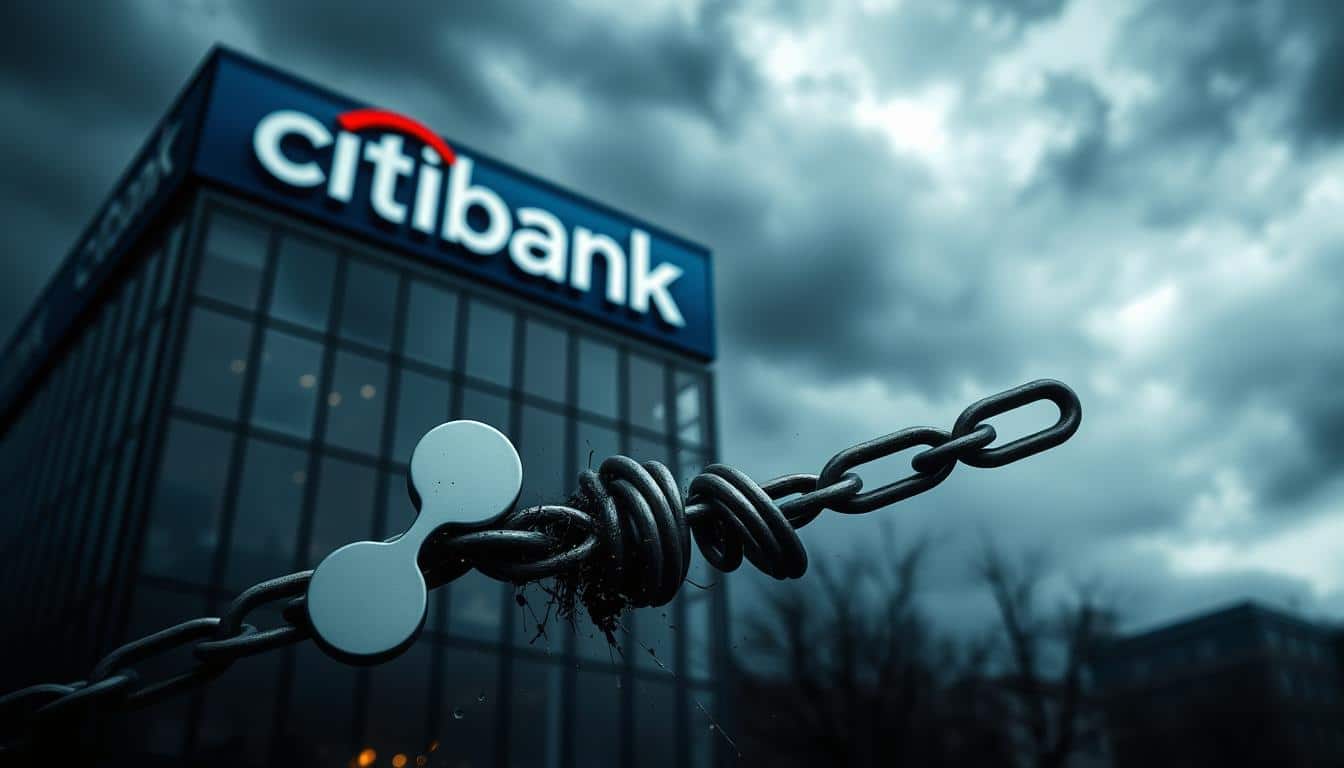Ripple’s Brad Garlinghouse Debanked by Citibank
In a surprising turn of events, Ripple’s Brad Garlinghouse has been debanked by Citibank. This development shakes the crypto world. It shows the growing tensions between traditional banks and crypto companies. Recent studies show that 62% of crypto bosses think banking ties are key to being seen as legit and stable1. Garlinghouse losing his bank account is more than a personal issue. It points to possible big changes in how banks deal with digital money and their creators.
As Ripple Labs’ boss, Garlinghouse has led the charge in combining blockchain and mainstream finance. This debanking brings up big worries about the future of these partnerships. It also raises concerns about regulatory barriers. News about Ripple’s CEO has caught everyone’s attention. People are eager to see what happens next in this drama, especially after checking the Brad Garlinghouse latest updates.
Key Takeaways
- Brad Garlinghouse’s debanking illustrates the ongoing tension between cryptocurrency firms and traditional banks.
- This event impacts Ripple Labs’ reputation and operations in the crypto space.
- Key executives believe banking relationships are vital for their legitimacy.
- This situation may result in increased regulatory scrutiny across the cryptocurrency sector.
- The market watches closely as the industry adapts to these challenges.
Overview of the Situation
Brad Garlinghouse, CEO of Ripple, has greatly influenced the crypto world since 2015. Ripple has become a key fintech player under his guidance, pushing for blockchain to improve payments. The recent issues with Citibank and Garlinghouse spotlight the tense crypto and bank relationship.
Background on Brad Garlinghouse
For over 25 years, Garlinghouse banked with Citigroup Inc. Then, they suddenly cut ties because of his crypto role2. He had just five days to move his money. His ordeal shows the clash between crypto individuals and the banking world. He warned such acts could block him from banking just for leading Ripple2. He sees these moves as legally doubtful3.
Introduction to Ripple Labs
Ripple Labs is a leader in the crypto revolution, aiming to change how global finance works. It has joined forces with many banks, blending blockchain with standard banking3. Despite Ripple’s XRP token’s price swings, reaching $0.6180, the crypto market hit $1.58 trillion, showing its expansion3.
Significance of Citibank’s Decision
Citibank closing Garlinghouse’s account is a big deal for him and Ripple. It shows the growing regulatory hurdles for crypto firms. Citibank’s move, based on his crypto stature, warns of the challenges leaders face in banking and regulation2.
What Does “Debanked” Mean?
“Debanked” means losing access to traditional banking. It’s a big deal in the cryptocurrency world. For example, Citibank banned Ripple, showing how banking and crypto are navigating their relationship. This raises questions about what being debanked means for the future.
Definition and Context
Debanking shows the hurdles in the cryptocurrency area. Take Brad Garlinghouse, for instance, who lost his bank account after 25 years2. Citigroup gave him just five days to move his money. This shows how quickly someone can be cut off2. Regulatory scrutiny on crypto figures adds to these challenges, making traditional banking harder for them2.
For crypto leaders, dealing with banking has become tougher. Current rules create an unfriendly environment, they say2.
Implications for Individuals and Companies
Being debanked can mess with both personal finances and business. Individuals can’t do everyday banking. Companies like Ripple face obstacles in growing and making deals2. Garlinghouse says his experience points to bigger issues. These problems threaten to leave people out of the financial system2.
The clash between crypto firms and banks is tension-filled. Both are trying to follow rules while adapting to new changes. This makes their relationship complicated.
Ripple’s Relationship with Financial Institutions
Ripple Labs has built strong Ripple partnerships with different financial groups. This has helped push forward its plan to blend its tech into banking. These partnerships are key to the company’s strategy for banking integration.
Partnerships Prior to Citibank
Before parting ways with Citibank, Ripple made key Ripple partnerships with MoneyGram and Santander. These partnerships improved real-time payments across borders. This proved how blockchain can make banking better. Brad Garlinghouse, Ripple’s CEO, mentioned these partnerships show Ripple’s goal to make worldwide transactions easy for everyone4.
Ripple’s Vision for Banking Integration
Ripple is working to change how finances work with its Ripple Labs banking strategy. The company sees a future where blockchain makes operations smoother. This would let banks move money faster and cheaper, putting Ripple at the forefront of banking integration5.
The Impact of Debanking on Ripple
Citibank recently ended its 25-year relationship with Brad Garlinghouse. This move has shook the crypto market deeply. It shows a pattern where U.S. banks avoid clients involved in cryptocurrency because of regulatory concerns and fear of breaking rules4. The market swiftly reacted, with investors looking closely at their investments after the Ripple XRP CEO issue.
Market Reactions to the News
After the news, Bitcoin’s value went up to more than $67,000, a 0.87% rise6. On the other hand, Ripple’s XRP token jumped to $0.6180. This is a 60% rise from its lowest point in the year, showing strong faith in XRP despite the banking troubles6. The market’s reaction shows it sees Citibank’s move as a warning for investing in cryptocurrencies.
Ripple’s Strategic Response
Ripple Labs is rethinking its strategy because of these challenges. Brad Garlinghouse suggested crypto startups move abroad due to unclear U.S. regulations4. He’s also hopeful about an XRP Exchange-Traded Fund (ETF) getting approved. This suggests a growing acceptance of cryptocurrencies7. Ripple will focus on building partnerships and managing its public image to overcome the debanking setback.
Citibank’s Position in the Financial Industry
Citibank plays a big part in worldwide finance. It offers many services like consumer banking, investment banking, and wealth management. Its cautious approach to cryptocurrency impacts its interactions with firms, including Ripple Labs. This shows how traditional banking and digital currencies are coming together.
Overview of Citibank’s Services
Citibank serves a wide range of customers through:
- Consumer Banking: Featuring personal accounts, loans, and credit services.
- Investment Banking: Offering advisory services, underwriting, and market making.
- Wealth Management: Including investment strategies and estate planning.
Its services make Citibank key in many financial deals. It is also careful in its role of Citibank in crypto.
Previous Relationships with Cryptocurrency Firms
Citibank’s recent news shows it cut ties with big names in crypto, like Ripple’s Brad Garlinghouse89. This highlights its strict view on crypto deals. It shows how traditional banks find it tough to deal with crypto, showing both opportunity and doubt.
As Citibank deals with the crypto world, it’s vital to see how its choices affect banking and crypto’s future.
Legal and Regulatory Implications
The cryptocurrency world is being shaped by ongoing legal challenges for Ripple. Ripple Labs is fighting important legal battles that might decide its fate.
Ongoing Legal Challenges for Ripple
Brad Garlinghouse can no longer use Citigroup Inc., despite having a 25-year relationship. This is due to regulatory pressures, making U.S. banks cautious with cryptocurrency clients4. Ripple faces scrutiny from the U.S. Securities and Exchange Commission over whether its XRP token is a security. This makes it hard for Ripple to prove itself in a strict regulatory setting.
Regulatory Scrutiny Across the Industry
It’s not just Ripple facing regulatory eyes, but the entire cryptocurrency field. Banks in the U.S. are wary of working with crypto businesses due to unclear regulations4. There’s also talk of new laws affecting cryptocurrencies and stablecoins. These changes might make it harder for crypto companies to innovate due to stricter rules10.
The Reaction from Cryptocurrency Communities
The crypto community has been buzzing about Brad Garlinghouse’s debanking. People are talking a lot on social media. They share both criticisms and support, showing how diverse the crypto world is. Experts are also weighing in, making the debate even richer. They discuss what this means for Ripple and the crypto future.
Social Media Responses
People on social media are showing many views on the debanking. Some can’t believe Citibank’s move against Ripple. They see it as a big challenge. Others look at how it affects the whole crypto market. They note crypto’s growth, with active addresses tripling. Now, there are 220 million as of September11. The rise of DeFi and decentralized exchanges show how tough the community is11.
Opinions from Industry Experts
Experts share their thoughts on the situation. One expert thinks Ripple might focus more on following the rules. This is because of more interest in products like stablecoins11. Others see a link between artificial intelligence and crypto users. This suggests new ways tech and finance could merge11. With changes in finance laws, Ripple could face big impacts, especially after the FIT21 Act’s approval11.
Understanding the Broader Financial Ecosystem
The role of classic banks is changing because of cryptocurrency. Banks and crypto are getting closer as banks use blockchain. This lets them meet customer needs and follow the rules while offering new things.
Role of Traditional Banks in Crypto
Traditional banks are now figuring out how to add cryptocurrency to their services. This move helps them stay important in a fast-changing world. About 42% of foreign exchange reserves of central banks worldwide are with BRICS+ countries. This shows the power of new financial trends1.
- Banking institutions are developing crypto-related services.
- There is a growing trend of banks providing custody services for digital assets.
- Financial institutions are beginning to collaborate with cryptocurrency exchanges.
The Future of Banking and Blockchain
Bringing blockchain into regular banking could make transactions more secure and fast. Banks see that cryptocurrencies are here to stay. The market for stablecoins might jump from $150 billion to $2.8 trillion by 202812. Also, BRICS+’s role in global trade could reach 20%, showing how important it is for banks to change1.
Ripple is leading the way by showing banks how to work with blockchain within legal limits12. This could mean less fraud and better rule-following.
Possible Reasons for Citibank’s Decision
Citibank ended its relationship with Ripple’s CEO Brad Garlinghouse for important reasons. These reasons include risk management in banking and following rules. As the finance world gets more unpredictable, staying strict about risk is key. Banks are careful when dealing with people involved in cryptocurrencies. This is especially true if they are part of businesses under a lot of legal attention.
Risk Management Concerns
Citibank cut ties to avoid risks linked to controversial groups. The growing interest in cryptocurrencies and their price changes worry banks. They must check everything carefully to avoid losses. This is vital when dealing with firms like Ripple, which face legal issues.
Regulatory Compliance Issues
Following the law is a big deal for banks looking at crypto relationships. Citibank needs to keep its operations within legal limits to protect its name and stability. Ripple’s legal battles, including those with the SEC over XRP, highlight why following rules is crucial. For more on how the finance world is changing, read here6.
The Future of Brad Garlinghouse
Brad Garlinghouse faces new challenges after Citibank’s recent decision. He might need to find new banking partners. This change has sparked discussions about his next steps. He could look into banks that welcome cryptocurrency businesses more warmly.
Potential Next Steps for Garlinghouse
Garlinghouse has several paths to consider:
- Engaging with niche banks that specialize in crypto-friendly services.
- Exploring partnerships in overseas markets where regulation is less stringent.
- Focusing on strengthening Ripple Labs’ ties with established financial institutions that support blockchain integration.
Outlook for Ripple Labs
Ripple Labs’ future is filled with hurdles, including legal issues. Yet, the company could find new ways to thrive. Ripple aims to improve its operations by embracing new tech solutions and following laws strictly.
The future of Brad Garlinghouse and Ripple Labs depends greatly on how they handle these challenges. They must enhance their partnerships in the finance world. Now is a crucial time for Garlinghouse’s leadership and Ripple Labs’ path forward110.
Lessons Learned from the Situation
The recent issues with Ripple Labs and Citibank’s decision against Brad Garlinghouse are huge for crypto companies. They show how dealing with traditional banks can be tricky. Knowing the effects on crypto firms helps them work better with these banks.
Impacts on Other Crypto Companies
Crypto companies need to talk clearly with banks. It’s all about following rules and managing risks well. From Ripple’s experience, companies see the value of connecting with regulators and improving how they talk to them.
If crypto firms aren’t clear and on top of things, banks might stop working with them. Ripple’s ability to get past many legal issues shows why being ready for court matters. It proves that being clear about what they do helps avoid big problems13.
Best Practices for Navigating Banking Relations
Crypto firms can make their banking relationships better by being believable. They can do this by:
- Establishing clear regulatory communications
- Conducting regular compliance audits
- Engaging with legal experts to navigate complex legal landscapes
- Building trust through transparency in transactions
Following these steps reduces the risk of debanking. It also makes the bond with the financial world stronger. The Ripple case teaches us how crypto firms can face these bank issues and come out stronger.
Conclusion: What Lies Ahead for Ripple and Garlinghouse
The story of Brad Garlinghouse and Ripple Labs marks a key moment for the world of cryptocurrency. They face big changes ahead because of their situation and new rules. Brad Garlinghouse shared that Citigroup Inc. cut ties with him after 25 years. This shows that banks in the U.S. are beginning to avoid working with cryptocurrency businesses4.
As these events unfold, experts think the connection between banks and digital currencies will change.
Predictions for the Cryptocurrency Market
Some believe that introducing an XRP Exchange-Traded Fund (ETF) could link traditional banking more closely with cryptocurrencies4. They also think changes in U.S. policies after the 2025 elections could shape the market. Right now, XRP is the second biggest cryptocurrency by market size. Its fans are very hopeful and supportive of its potential14.
Final Thoughts on Banking and Crypto Collaboration
The bond between banks and cryptocurrency companies is important and is changing because of more rules. Startups in the crypto space are advised to look at operating outside the U.S. This is due to the unclear regulations4. But as groups like Binance work hard to follow the rules, working together might get easier. This could lead to banks and cryptocurrencies joining forces more smoothly15.
What happens next will not only impact Ripple’s future. It will also help shape how the cryptocurrency world develops.








 Bitcoin
Bitcoin  Ethereum
Ethereum  Tether
Tether  XRP
XRP  USDC
USDC  Solana
Solana  TRON
TRON  Lido Staked Ether
Lido Staked Ether  Dogecoin
Dogecoin  Figure Heloc
Figure Heloc  Bitcoin Cash
Bitcoin Cash  WhiteBIT Coin
WhiteBIT Coin  Cardano
Cardano  USDS
USDS  Wrapped stETH
Wrapped stETH  LEO Token
LEO Token  Hyperliquid
Hyperliquid  Wrapped Bitcoin
Wrapped Bitcoin  Chainlink
Chainlink  Binance Bridged USDT (BNB Smart Chain)
Binance Bridged USDT (BNB Smart Chain)  Monero
Monero  Ethena USDe
Ethena USDe  Canton
Canton  Stellar
Stellar  Wrapped eETH
Wrapped eETH  Zcash
Zcash  USD1
USD1  Hedera
Hedera  sUSDS
sUSDS  Litecoin
Litecoin  Dai
Dai  Coinbase Wrapped BTC
Coinbase Wrapped BTC  Avalanche
Avalanche  Shiba Inu
Shiba Inu  PayPal USD
PayPal USD  WETH
WETH  Sui
Sui  Toncoin
Toncoin  Rain
Rain  USDT0
USDT0  Cronos
Cronos  World Liberty Financial
World Liberty Financial  Tether Gold
Tether Gold  Polkadot
Polkadot  PAX Gold
PAX Gold  Uniswap
Uniswap  MemeCore
MemeCore  Ethena Staked USDe
Ethena Staked USDe